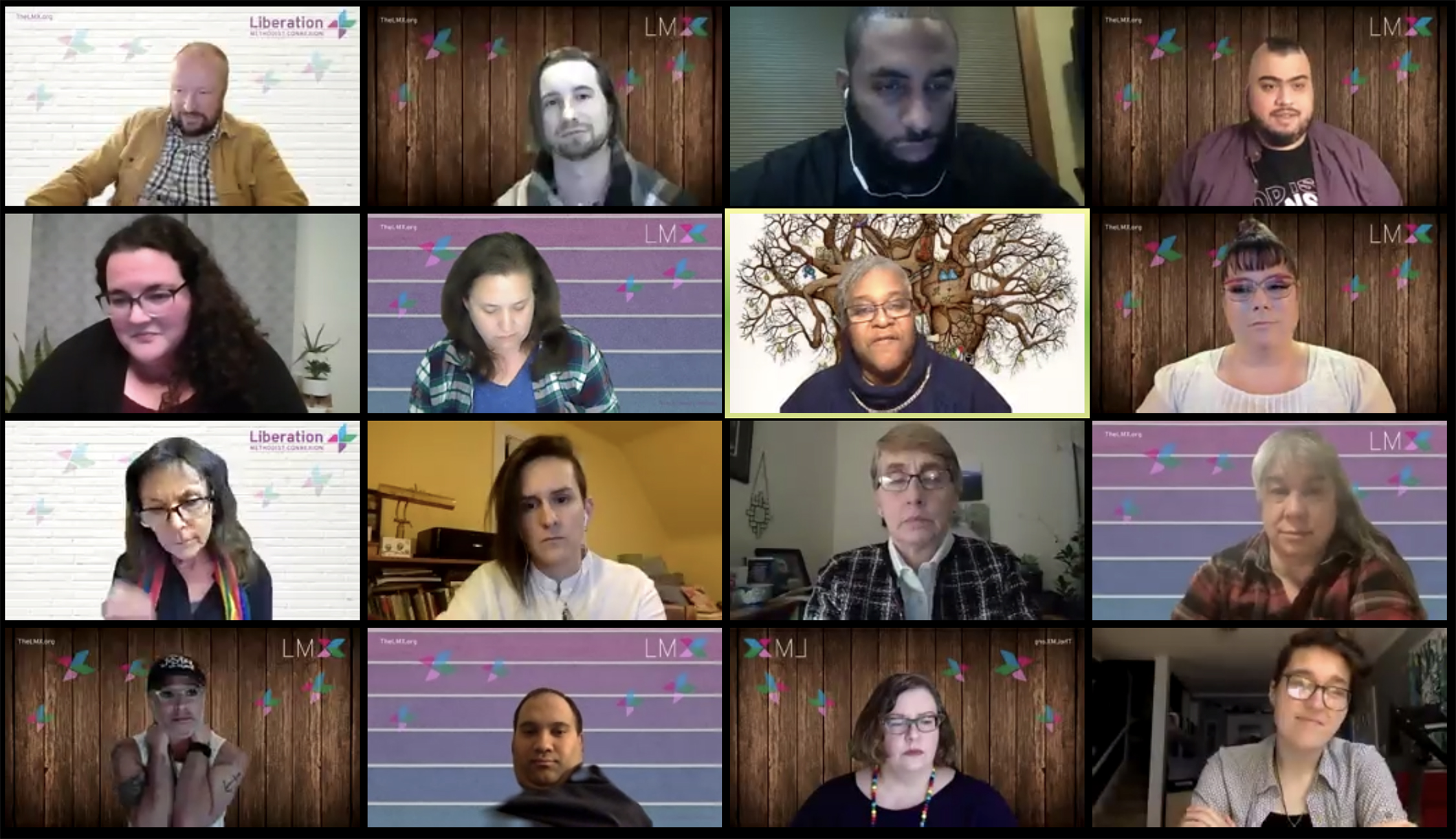(RNS) — A group of progressive United Methodists announced Sunday (Nov. 29) they are forming a new Methodist denomination, the Liberation Methodist Connexion, or LMX.
For half a century, the United Methodist Church has debated the full inclusion of its LGBTQ members. It pushed any discussion of sexuality from its quadrennial General Conference meeting in 2016 to a special session in 2019, where delegates voted against allowing the church to ordain LGBTQ clergy or perform same-sex marriages.
A new plan has been proposed since then to split the denomination according to beliefs on LGBTQ ordination and same-sex marriage. The split was to be decided upon at the 2020 General Conference, but due to COVID-19 shutdowns, the conference was cancelled and the decision postponed until next fall at the earliest.
Some United Methodists have simply grown tired of waiting.
“The timeline of the Holy Spirit is driving our decision to launch LMX at this moment, and we are responding to that call,” the Rev. Althea Spencer-Miller said during a presentation Sunday evening following the denomination’s first online worship service.
The Liberation Methodist Connexion describes itself on its website as “a grassroots denomination of former, current, and non-Methodist faith leaders working on the unfolding of the kin-dom of God.”
The website lists more than 40 collaborators involved in founding the new denomination, who call themselves “Liberationists.” Those who spoke during Sunday’s presentation declined to say how many churches or individuals have expressed interest in joining.
The LMX seeks to embrace the “full participation of all who are living out their God-given identities and expressions,” according to the site. That includes people of all gender expressions and sexual identities, races and ethnicities, mental and physical abilities, sizes and ages.
Its theology “is not written in stone,” the website said, but it builds on Methodist theology with various expressions of Liberation theologies, which were first developed by Latin American Roman Catholics in the 1950s and 1960s.
More from Broadview:
- Churches return land to Indigenous groups as part of #LandBack movement
- United Church of Canada apologizes for role in forced adoptions
- Texas United Methodists take up call to replace logo over link to racist imagery
Correct doctrine is less important to the new denomination than correct action, collaborators said during Sunday’s presentation. That action includes reparations, caring for the earth, and finding new ways to live together outside of systems like colonialism, white supremacy, patriarchy, clericalism and heteronormativity, they said.
“We seek not answers that lead us to correct doctrines as to why we suffer. We seek correct actions, correct praxis, where God sustains us during the unanswerable questions,” Spencer-Miller said.
God was there in the seeds of the movement John Wesley started, she said.
“We are its queer, strange fruit,” she added.
But members aren’t expected to leave their denominations or faiths to join the LMX. In fact, collaborators said Sunday, United Methodist members are encouraged to continue to partner with the United Methodist Church’s ethnic caucuses.
“There are no doctrinal litmus tests in the movement. We are moving beyond the supremacy of a single belief system,” said the Rev. Janet G. McKeithen, a member of the Connexion working group.

It’s about following Jesus to the margins, added the Rev. Alex da Silva Souto, one of the leaders of UM-Forward and a General Conference delegate from the New York Conference.
Da Silva Souto told RNS in May that a coalition of groups already describing themselves as Liberationists had been discussing the possibility of forming a new denomination. That discussion grew out of events — the UM-Forward summit in May 2019 in Minneapolis, an Advent gathering outside of Denver, a Lenten gathering this spring in Dallas — following a special session of the United Methodist General Conference in 2019.
The Traditional Plan favored by theologically conservative United Methodists, approved at that special session, was set to take effect earlier this year, strengthening language in the denomination’s Book of Discipline barring LGBTQ clergy from being ordained and same-sex couples from marrying in the United Methodist Church.
But United Methodist bishops and advocacy group leaders from across theological divides agreed to a moratorium on its enforcement in January after negotiating a proposal to split the denomination, called, “A Protocol of Reconciliation and Grace Through Separation.” The proposal, negotiated by 16 United Methodists, would commit $25 million to create a new conservative “traditionalist” Methodist denomination. The “post-separation United Methodist Church” would then have the opportunity to rescind the Traditional Plan and pass affirming language.
Delegates would have voted on that proposal at the United Methodist General Conference scheduled in May. At the time, Da Silva Souto called its postponement, due to the pandemic, a “curveball.”
But, said Da Silva Souto, “we’re not waiting for the protocol to answer the call that we feel, which is love and liberation right now.”
The LMX is planning to host its next worship service on New Year’s Eve and encouraged those interested in joining to sign up for its email newsletter on its website.















Some United Methodists have simply grown tired of waiting.
“The timeline of the Holy Spirit is driving our decision to launch LMX at this moment, and we are responding to that call,” But, said Da Silva Souto, “we’re not waiting for the protocol to answer the call that we feel, which is love and liberation right now.”
If you’re tired of waiting, I doubt it is the Holy Spirit as the driving force. Funny, patience is part of the “Fruit of the Spirit”.
“We seek not answers that lead us to correct doctrines as to why we suffer. We seek correct actions, correct praxis, where God sustains us during the unanswerable questions,”
That’s like asking the mechanic to fix the knocking in the engine without lifting the hood. BTW, “Why we suffer” is an answerable question. While there are many references 1 Peter 4:19 comes to mind.
Doctrine is a human construct. There is no “correct” doctrine, only those rules and concepts that each group agrees to follow. Unfortunately, many doctrines are rigid and don’t allow for new understanding. Actually living the examples of loving, caring, accepting, forgiving as well as having an open mind and being of service are noble attributes that religionists claim to espouse. (They can also he held by atheists as well) Those who wrote scripture were human and wrote based on their own limited experience and philosophy which was based on their culture, their upbringing, their understanding and education and even superstition.
One’s belief in God should be based on one’s understanding and experience. My spiritual journey has taught me that. But getting together as a group sometimes tends to cripple one’s ability to think critically and we become bound by group-think. However some, even many folks prefer to be a part of a group and if that works for these folks that’s great. I wish them well. We are all God’s creatures and we should have the right, without criticism, to understand God in our own way. Congratulations on this new adventure!
Doctrine is a set of principles and standards to govern our lives. These principles and standards are agreed to by the particular group setting them. If new understanding opposes these principles and standards the group has the right to accept or reject the opposition. (It is the groups possession.) Your examples are nice, but you forgot justice, holiness, (and if you accept attributes of God – jealousy, anger, hate and wrath.)
James 3:13-18, Who is wise and understanding among you? By his good conduct let him show his works in the meekness of wisdom. But if you have bitter jealousy and selfish ambition in your hearts, do not boast and be false to the truth. This is not the wisdom that comes down from above, but is earthly, unspiritual, demonic. For where jealousy and selfish ambition exist, there will be disorder and every vile practice. But the wisdom from above is first pure, then peaceable, gentle, open to reason, full of mercy and good fruits, impartial and sincere. And a harvest of righteousness is sown in peace by those who make peace.
Don’t agree. God granted me the ability to think. The United Church told me to go to university and become educated with a B.A and an M. Div. which I did. University taught me to think critically which I try to do. I do not run with the herd. I am a free thinker. My spiritual journey has taken me fifty years through many Christian sects and a couple of non Christian groups. I choose to understand God in my own way and it works for me. However I respect other paths. I choose to adhere to the teachings of Jesus. Very simple.
Here are two:
“I am the way and the truth and the life. No one comes to the Father except through me.”
“Do not suppose that I have come to bring peace to the earth. I did not come to bring peace, but a sword. For I have come to turn ‘a man against his father, a daughter against her mother, a daughter-in-law against her mother-in-law – a man’s enemies will be the members of his own household.”
When the church “fathers” tried to make the mythological, allegorical and esoteric truths available to the ordinary people, these understandings became literalized to the point that religion has now become laughable if it were not pitiful. Merely parroting someone else’s understanding does little to expand one’s understanding of God living within each of us as well as around us. We are of God and in God. God is known by other names. God is the power and the quantum field and is not confined to merely one mortal human who lived two thousant years ago.
“We are of God and in God.” “God is the power and the quantum field and is not confined to merely one mortal human who lived two thousand years ago.”
How do you know this?
Yunus Emre, 13 th century Sufi poet
“God’s truth is an ocean and the doctrines of faith a ship,
Few will leave the vessel and plunge into the sea.”
Actually he was inadvertently right. Christ claimed to be (and He is) truth. Very few delve into the Truth. John 1:14, John 14:6, John 8:31-32, Ephesians 1:13-14